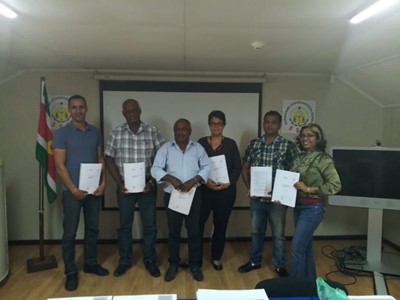Standard "Good Agricultural Practice for Agricultural Crops" established as a national standard
01 January 0001
The Surinamese Standards Bureau (SSB) recently adopted the standard “Good Agricultural Practice for Agricultural Crops” known as the GAP standard as the National Standard.
Pursuant to Article 5 of the Standards Act (SB2004, no.121, as last amended by SB2012, no.42), and the order of the Minister of Trade and Industry of August 1, 2012, no.1177, is effective August 10, 2018 adopted the National Standard.
This standard contains the minimum requirements for optimal agricultural management and good agricultural techniques that must guarantee food safety. The standard applies to all fruit and vegetable producers in Suriname, regardless of the size of the company or the production area.
The application of this standard by small, medium and large agricultural companies in Suriname should also ensure that the local population is guaranteed safe food and that the producers have more export options for their agricultural products.
The Technical Commission, which has worked hard on the development of this standard, consisted of various experts from the agricultural sector. They have made a very important contribution to the realization of this standard by sharing their knowledge and experience. The Surinamese Standards Bureau therefore gives special thanks to the following organizations and their representatives: Association of Exporters for Agricultural Products in Suriname (VEAPS): mr. Ir. Riekhnath Sanchit, Agricultural cooperative Kwatta: mr. Ing. Diego Rodriquez, Capricorn Projekt B.V .: Mrs. Ir. Jenna Wijngaarde, Association of Surinamese Manufacturers (ASFA): mr. Rudy Soekhlal, Ministry of Agriculture, Livestock and Fisheries (LVV): mrs. Alies van Sauers-Muller BSc. (now private consultant), Ministry of Agriculture, Livestock and Fisheries (LVV): mr. Radjen Bisessar BSc. (now Green Grow Garden), Gopex N.V .: mrs. Prashanti Orie BSc. (Now Green Garden Grow) and mr. Sherwien Buddha as an independent expert.
After this milestone, the Technical Commission has a larger goal in mind. As a result, they would like to see this National Standard elevated to a Technical Regulation. Preparations for this are in full swing.
It is hoped that this standard (and by extension the Technical Regulations) will contribute to the further growth and strengthening of the agricultural sector in Suriname.
